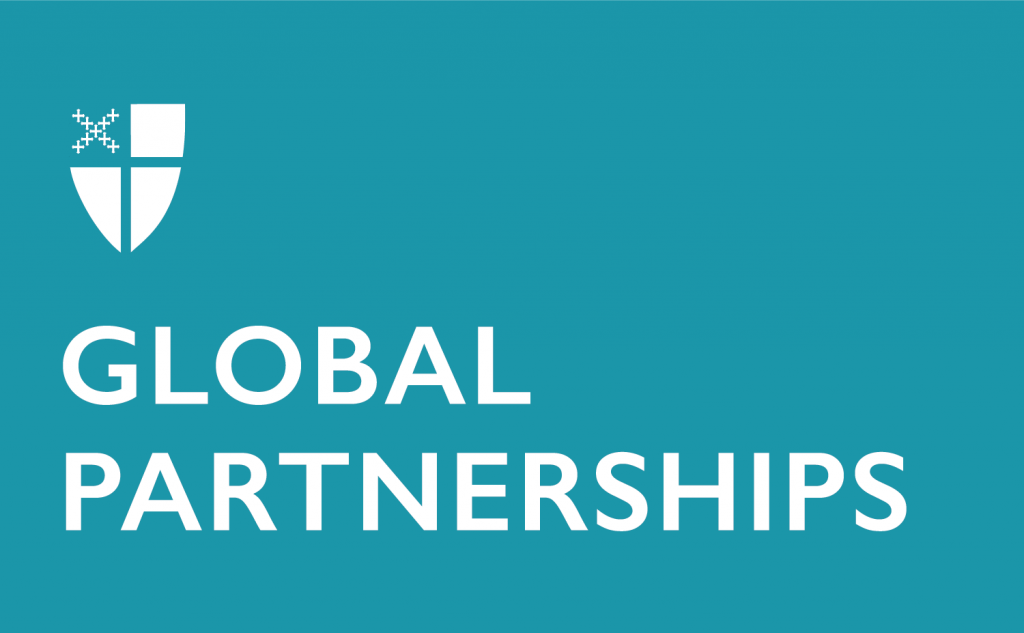Empowering Girls: Beijing and Beyond
By: Maria Gonzalez, Diocese of Olympia (Province VIII)
Several years ago, my abue gave me some advice: “Ve a escuela. Aprende algo útil para que puedas sostenerte.” Go to school. Learn something useful to sustain yourself. Her advice was simple, but her tone was resolute. I don’t know where we were when she told me this, nor do I remember what we were talking about. I do, however, know the context from which her advice came.
Abue grew up in Mérida, Yucatán. She loved Mérida, and she still does, but I believe her one regret is that she never actually finished school. She only went to school through eighth grade because that is what was expected of her — what was expected of a girl. Abue and abuelo immigrated to Los Angeles when my dad was seven. Abue found work at a dress shop and at the City Hall cafeteria, among other things. I’ve never heard her explicitly express discontent with these jobs, but her advice is telling. Go to school. Learn something useful to sustain yourself. I believe this is what she wishes someone had told her as a girl. As she grew older, she realized that girls deserve a complete, quality education. They deserve to be raised in love and given a fair shot. Girls deserve nothing short of the world.
I became involved with UNCSW because there are still girls in the world who, seventy years later, are having the same experience that abue did because countries across the world continue to fail to provide girls with what they need and deserve. In its 12th critical area of concern, entitled “The girl child,” the 1995 Beijing Declaration and Platform for Action recognizes these failures and the impact they have on a girl throughout her life. Social institutions, traditions, and practices are the root of discrimination against the “girl child.” Discrimination starts in the earliest stages of a girl’s life and continues through her adulthood. Girls are continually treated as inferior and are socialized to put themselves last; this neglect and discrimination leads to “a lifelong downward spiral of deprivation and exclusion from the social mainstream” (165).
There are many different mechanisms that precipitate and perpetuate this “spiral.” Education is one of these mechanisms. In 1995, 81 million girls had no access to primary school (166). Today, at least 132 million girls are out of school: 34.3 million of primary school age, 30 million of lower-secondary school age, and 67.4 million of upper-secondary school age (UNICEF). Furthermore, although school has the potential to be transformational, the Platform for Action emphasizes how gender-biased educational processes including “curricula, educational materials and practices, teachers’ attitudes and classroom interaction” serve to reinforce existing gender inequalities. Teachers are especially important as they — along with parents, teachers, and the media — can transmit conflicting and confusing messages on gender roles (165). For some girls, school can also be a place in which they are “less encouraged than boys to participate in and learn about the social, economic, and political functioning of society” (166). The result of this dynamic is that girls are offered fewer opportunities than boys to take part in decision making-processes.
Gender inequality is also perpetuated by discrimination in health services. Lack of access to nutrition, physical, and mental health services endangers a girl’s current and future health (166). In 1995, an estimated 450 million adult women in developing countries were experiencing stunted growth as a result of childhood malnutrition. Sadly, malnutrition remains a problem today; in 2016, 5.7% of adolescent girls were underweight (UNICEF). Additionally, youth, social pressures, lack of protective laws, and failure to enforce laws expose girls to different types of violence, particularly sexual violence. Girls are also more vulnerable to the “consequences of unprotected and premature sexual relations” (166). Early-child, as well as early marriage, results “continues to be an impediment to the economic, and social status of women” across the globe (167). UNICEF estimates that 650 million girls and women alive today were married as children, and around 12 million girls around the world are married each year.
The Platform for Action, combined with today’s statistics, admittedly paints a grim picture of the reality that girls around the world face today. The Platform for Action identified many different actions that governments needed to take to eliminate discrimination, economic exploitation, violence, and negative cultural attitudes against the “girl child.” It also identifies strategies for eliminating discrimination in education and health services, as well as promoting and protecting the rights of the “girl child.” Although there has been some improvement, it is clear that much more needs to be done to empower girls and ensure equal dignity and respect.
When I was at UNCSW62, one speaker identified discrimination against girls as a “humanitarian crisis.” To some, this term might seem extreme. The reality is that it is true. In The Episcopal Church, I have always been taught that all people were created in God’s image, that all people should be treated with dignity and respect, and that all people deserve love. The treatment of girls and women across the world today does not reflect these teachings. Women and girls are living through a humanitarian crisis because they do not receive the love that all of God’s people deserve.
So, what can you do about this? What can we do about this? These are questions that I often ask myself. When it is difficult to come up with an answer, difficult to draw any kind of inspiration, I try to think of what gives me hope. I teach a civics course to fifth graders in Boston Public Schools. My students — especially the girls — give me hope. They are engaged and involved, they care about what they are learning, and they give remarkably insightful answers. Last week, one girl even did the renegade after speaking quite eloquently to checks and balances. I was amazed.
Washington state voters’ decision to approve Referendum 90 earlier this week also gives me hope. R90 will require public schools to provide comprehensive sexual health education to all students. Sexual health education is critical for achieving gender equality. It allows girls to receive the information they need to make informed decisions about their bodies. Knowledge is power, and I am so happy that girls in my state will have both going forward.
The last thing that gave me hope this week was a historic election. Representation matters. It always has. Vice President-elect Kamala Harris — a Black woman and the first woman to be elected to the office — embodies the future. Girls of color and women of color are almost always made to feel small in spaces that matter. Harris, however, has demonstrated that anything is possible. Girls across the country can finally dare to dream. This is empowerment. This is what gives me hope.
So, as you think about what you can do to empower girls, I have a couple of suggestions. First, just listen. Girls’ voices are silenced too often. They deserve to speak, to be heard, and to be respected. Next, identify what you can do to change systems that perpetuate discrimination. Vote, write to your representative, or even go to a school board meeting. Finally, tell girls about your life and your job, especially if you identify as a woman. It is much easier for girls to dream about the future when they see themselves reflected in certain positions or when they have a mentor to guide them. These might seem like small actions in comparison to what is being done at the United Nations, but sometimes small actions are the perfect catalyst for change.
Girls deserve dignity, respect, and love. Take a moment, breathe, and get to work.
_______________

About the author: Maria worships in the Diocese of Olympia and is a student at Harvard University, where she plans to concentrate in Government and Economics. Maria was a delegate to UNCSW 62 in 2018 and also served as a member of the Official Youth Presence at the 79th General Convention, where she gave the youth address. Maria will head her diocesan deputation at General Convention in 2021. Maria is passionate about women’s empowerment and creation care, and she has participated in the Diocese of Olympia’s Southern Social Justice Experience and Creation Care pilgrimages.
Empoderar a las niñas: Beijing y más allá
By: Maria Gonzalez, Diócesis de Olympia (Provincia VIII)
Hace varios años, mi abue me dio un consejo: “Ve a escuela. Aprende algo útil para que puedas sostenerte.” Su consejo fue simple, pero su tono fue decidido. No sé dónde estábamos cuando me dijo esto, ni recuerdo de qué estábamos hablando. Sin embargo, conozco el contexto del que provino su consejo.
Abue creció en Mérida, Yucatán. Amaba Mérida, y todavía lo ama, pero creo que lo único que lamenta es que nunca terminó la escuela. Solo fue a la escuela hasta el octavo grado porque eso es lo que se esperaba de ella, lo que se esperaba de una niña. Abue y abuelo emigraron a Los Ángeles cuando mi papá tenía siete años. Abue encontró trabajo en una tienda de ropa y en la cafetería del Ayuntamiento, entre otras cosas. Nunca la he escuchado expresar explícitamente su descontento con estos trabajos, pero su consejo es revelador. Ir al colegio. Aprenda algo útil para mantenerse. Creo que esto es lo que desearía que alguien le hubiera dicho cuando era niña. A medida que crecía, se dio cuenta de que las niñas merecen una educación completa y de calidad. Merecen ser criados en amor y recibir una oportunidad justa. Las niñas merecen nada menos que el mundo.
Me involucré con UNCSW porque todavía hay niñas en el mundo que, setenta años después, están teniendo la misma experiencia que tuvo abue porque los países de todo el mundo continúan sin brindarles a las niñas lo que necesitan y merecen. En su duodécima área crítica de preocupación, titulada “La niña”, la Declaración y Plataforma de Acción de Beijing de 1995 reconoce estos fracasos y el impacto que tienen en una niña a lo largo de su vida. Las instituciones, tradiciones y prácticas sociales son la raíz de la discriminación contra la “niña”. La discriminación comienza en las primeras etapas de la vida de una niña y continúa hasta la edad adulta. Las niñas son continuamente tratadas como inferiores y socializadas para que se pongan últimas; este descuido y discriminación conduce a “una espiral descendente de privación y exclusión de la corriente social de por vida” (165).
Hay muchos mecanismos diferentes que precipitan y perpetúan esta “espiral”. La educación es uno de estos mecanismos. En 1995, 81 millones de niñas no tenían acceso a la escuela primaria (166). En la actualidad, al menos 132 millones de niñas no van a la escuela: 34,3 millones en edad de cursar la escuela primaria, 30 millones en edad de cursar la secundaria inferior y 67,4 millones en edad de cursar la secundaria superior (UNICEF). Además, aunque la escuela tiene el potencial de ser transformadora, la Plataforma de Acción enfatiza cómo los procesos educativos con sesgo de género, incluidos “planes de estudio, materiales y prácticas educativos, actitudes de los maestros e interacción en el aula”, sirven para reforzar las desigualdades de género existentes. Los maestros son especialmente importantes ya que ellos, junto con los padres, los maestros y los medios de comunicación, pueden transmitir mensajes contradictorios y confusos sobre los roles de género (165). Para algunas niñas, la escuela también puede ser un lugar en el que “se las anima menos que a los niños a participar y aprender sobre el funcionamiento social, económico y político de la sociedad” (166). El resultado de esta dinámica es que las niñas tienen menos oportunidades que los niños para participar en los procesos de toma de decisiones.
La desigualdad de género también se perpetúa por la discriminación en los servicios de salud. La falta de acceso a los servicios de nutrición, salud física y mental pone en peligro la salud actual y futura de una niña (166). En 1995, se estimaba que 450 millones de mujeres adultas en países en desarrollo experimentaban retraso en el crecimiento como resultado de la desnutrición infantil. Lamentablemente, la desnutrición sigue siendo un problema en la actualidad; en 2016, el 5,7% de las adolescentes tenían bajo peso (UNICEF). Además, la juventud, las presiones sociales, la falta de leyes de protección y la falta de cumplimiento de las leyes exponen a las niñas a diferentes tipos de violencia, particularmente violencia sexual. Las niñas también son más vulnerables a las “consecuencias de las relaciones sexuales prematuras y sin protección” (166). Los resultados de la primera infancia, así como del matrimonio precoz, “siguen siendo un impedimento para la condición económica y social de la mujer” en todo el mundo (167). UNICEF calcula que 650 millones de niñas y mujeres vivas en la actualidad se casaron cuando eran niñas y alrededor de 12 millones de niñas en todo el mundo se casan cada año.
La Plataforma de Acción, combinada con las estadísticas de hoy, sin duda pinta un panorama sombrío de la realidad que enfrentan hoy las niñas de todo el mundo. La Plataforma de Acción identificó muchas acciones diferentes que los gobiernos debían tomar para eliminar la discriminación, la explotación económica, la violencia y las actitudes culturales negativas contra la “niña”. También identifica estrategias para eliminar la discriminación en la educación y los servicios de salud, así como para promover y proteger los derechos de la “niña”. Aunque ha habido algunas mejoras, está claro que se necesita hacer mucho más para empoderar a las niñas y garantizar la igualdad de dignidad y respeto.
Cuando estuve en UNCSW62, un orador identificó la discriminación contra las niñas como una “crisis humanitaria”. Para algunos, este término puede parecer extremo. La realidad es que es verdad. En la Iglesia Episcopal, siempre me han enseñado que todas las personas fueron creadas a imagen de Dios, que todas las personas deben ser tratadas con dignidad y respeto, y que todas las personas merecen amor. El trato que reciben las niñas y las mujeres en todo el mundo hoy en día no refleja estas enseñanzas. Las mujeres y las niñas están atravesando una crisis humanitaria porque no reciben el amor que todo el pueblo de Dios merece.
Entonces, ¿qué puedes hacer al respecto? ¿Qué podemos hacer al respecto? Son preguntas que me hago a menudo. Cuando es difícil encontrar una respuesta, difícil obtener algún tipo de inspiración, trato de pensar en lo que me da esperanza. Doy un curso de educación cívica a estudiantes de quinto grado en las Escuelas Públicas de Boston. Mis alumnos, especialmente las niñas, me dan esperanza. Están comprometidos e involucrados, se preocupan por lo que están aprendiendo y dan respuestas notablemente perspicaces. La semana pasada, una niña incluso hizo el renegado después de hablar con bastante elocuencia sobre los controles y equilibrios. Estaba impresionado.
La decisión de los votantes del estado de Washington de aprobar el Referéndum 90 a principios de esta semana también me da esperanzas. R90 requerirá que las escuelas públicas brinden educación integral sobre salud sexual a todos los estudiantes. La educación en salud sexual es fundamental para lograr la igualdad de género. Permite a las niñas recibir la información que necesitan para tomar decisiones informadas sobre sus cuerpos. El conocimiento es poder, y estoy muy feliz de que las niñas de mi estado tengan ambos en el futuro.
Lo último que me dio esperanzas esta semana fue una elección histórica. La representación importa. Siempre lo ha hecho. La vicepresidenta electa Kamala Harris, una mujer negra y la primera mujer en ser elegida para el cargo, encarna el futuro. Las niñas de color y las mujeres de color casi siempre se sienten pequeñas en los espacios que importan. Harris, sin embargo, ha demostrado que todo es posible. Las niñas de todo el país finalmente pueden atreverse a soñar. Esto es empoderamiento. Eso es lo que me da esperanza.
Entonces, mientras piensa en lo que puede hacer para empoderar a las niñas, tengo un par de sugerencias. Primero, escuche. Las voces de las niñas se silencian con demasiada frecuencia. Merecen hablar, ser escuchados y respetados. A continuación, identifique lo que puede hacer para cambiar los sistemas que perpetúan la discriminación. Vote, escriba a su representante o incluso asista a una reunión de la junta escolar. Por último, cuénteles a las niñas sobre su vida y su trabajo, especialmente si se identifica como mujer. Es mucho más fácil para las niñas soñar con el futuro cuando se ven reflejadas en determinadas posiciones o cuando tienen un mentor que las orienta. Estas pueden parecer pequeñas acciones en comparación con lo que se está haciendo en las Naciones Unidas, pero a veces las pequeñas acciones son el catalizador perfecto para el cambio.
Las niñas merecen dignidad, respeto y amor. Tómate un momento, respira y ponte manos a la obra.
______________

Sobre la autora: Maria adora en la Diócesis de Olympia y es estudiante en la Universidad de Harvard, donde planea concentrarse en Gobierno y Economía. María fue delegada de UNCSW 62 en 2018 y también se desempeñó como miembro de la Presencia Oficial de la Juventud en la 79 a Convención General, donde pronunció el discurso de la juventud. María encabezará su delegación diocesana en la Convención General en 2021. A María le apasiona el empoderamiento de las mujeres y la atención a la creación, y ha participado en las peregrinaciones de Cuidado de la Creación y la Experiencia de Justicia Social del Sur de la Diócesis de Olimpia.


